Background
José Hipólito Unánue was born in Arica, Peru, on August 13, 1755, of a well-to-do family who directed him toward an ecclesiastical career.


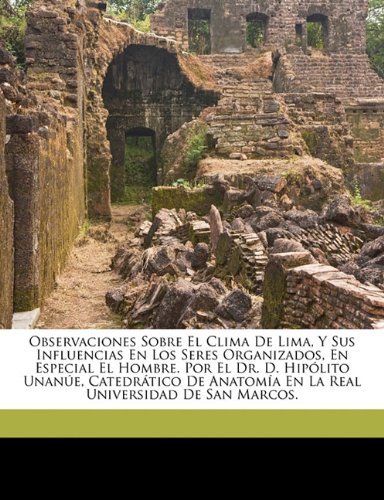
(This is a reproduction of a book published before 1923. T...)
This is a reproduction of a book published before 1923. This book may have occasional imperfections such as missing or blurred pages, poor pictures, errant marks, etc. that were either part of the original artifact, or were introduced by the scanning process. We believe this work is culturally important, and despite the imperfections, have elected to bring it back into print as part of our continuing commitment to the preservation of printed works worldwide. We appreciate your understanding of the imperfections in the preservation process, and hope you enjoy this valuable book.
http://www.amazon.com/gp/product/1172126933/?tag=2022091-20
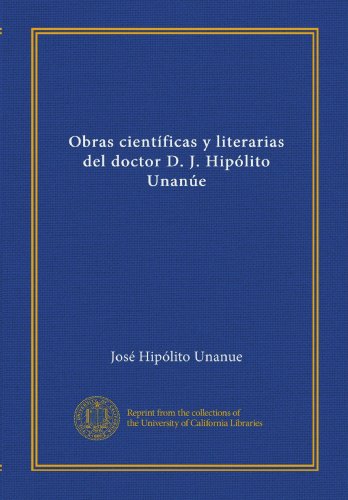
(This book was digitized and reprinted from the collection...)
This book was digitized and reprinted from the collections of the University of California Libraries. It was produced from digital images created through the libraries mass digitization efforts. The digital images were cleaned and prepared for printing through automated processes. Despite the cleaning process, occasional flaws may still be present that were part of the original work itself, or introduced during digitization. This book and hundreds of thousands of others can be found online in the HathiTrust Digital Library at www.hathitrust.org.
http://www.amazon.com/gp/product/B0088B4EYQ/?tag=2022091-20
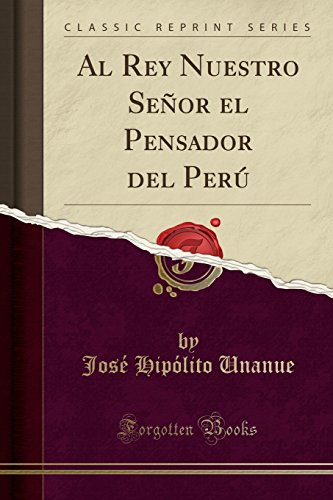
(Excerpt from Al Rey Nuestro Señor el Pensador del Perú L...)
Excerpt from Al Rey Nuestro Señor el Pensador del Perú La representacion que sigue del Pensador del Peri? Á S. M. Debe considerarse como una continuacion del'díscurso que en época. Muy déferente Ju'go (i la nacion en defensa del Marques de la consegüencía del papel que contro, este personage in 'serta'ron en el ¿periódico llamado Tribuno del pueblo algunos perversos de ese tiempo verdaderamente la mentable y de ¡las imposturas y (atroces calumnias gue el diputado Rivero habia producido en el sa lon de comes sobre-el mismo asunto. Habría sido-sin duda muy útil que Lprwedíese á este discurso el que posteriormente hizo dicho dípuwdo ¡contra-elvi rey y que hemos recibido ¿por famhïíad con 'muu cha posterioridad; pero á mas de que ofender-{amos la prensa haciéndola gemir con un cúmulo tan asom broso de falsedades e' insultos la patria necesita imponerse á ¿a mayor brevedad de algunas verda des que se presentan en esm produccion, que aunque desnudas de los adornos de una eloqüenozïa encan. About the Publisher Forgotten Books publishes hundreds of thousands of rare and classic books. Find more at www.forgottenbooks.com This book is a reproduction of an important historical work. Forgotten Books uses state-of-the-art technology to digitally reconstruct the work, preserving the original format whilst repairing imperfections present in the aged copy. In rare cases, an imperfection in the original, such as a blemish or missing page, may be replicated in our edition. We do, however, repair the vast majority of imperfections successfully; any imperfections that remain are intentionally left to preserve the state of such historical works.
http://www.amazon.com/gp/product/0282312013/?tag=2022091-20
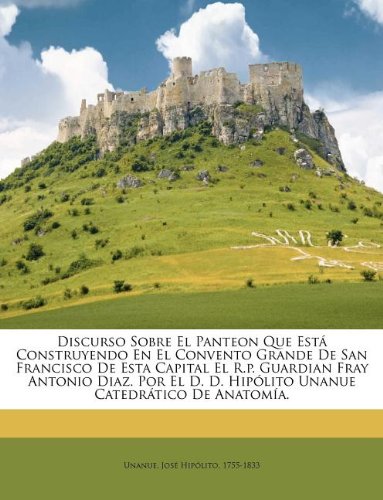
(This is a reproduction of a book published before 1923. T...)
This is a reproduction of a book published before 1923. This book may have occasional imperfections such as missing or blurred pages, poor pictures, errant marks, etc. that were either part of the original artifact, or were introduced by the scanning process. We believe this work is culturally important, and despite the imperfections, have elected to bring it back into print as part of our continuing commitment to the preservation of printed works worldwide. We appreciate your understanding of the imperfections in the preservation process, and hope you enjoy this valuable book.
http://www.amazon.com/gp/product/1176124706/?tag=2022091-20
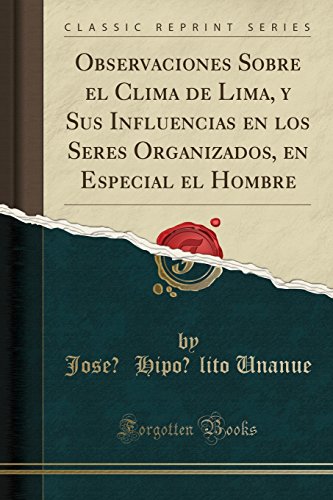
(Excerpt from Observaciones Sobre el Clima de Lima, y Sus ...)
Excerpt from Observaciones Sobre el Clima de Lima, y Sus Influencias en los Seres Organizados, en Especial el Hombre Sr. Don Mnri...iúo Martinez. 5f.1)nn Diego de la Casa y Piedra, Tés'orcro de la Mesa Capitular. Sr. Doct. Don Francisco: Echag'íie, Cáñémigo úpemtei1cin'rio de esia S'ahta Iglesia Metrºpolitana. About the Publisher Forgotten Books publishes hundreds of thousands of rare and classic books. Find more at www.forgottenbooks.com This book is a reproduction of an important historical work. Forgotten Books uses state-of-the-art technology to digitally reconstruct the work, preserving the original format whilst repairing imperfections present in the aged copy. In rare cases, an imperfection in the original, such as a blemish or missing page, may be replicated in our edition. We do, however, repair the vast majority of imperfections successfully; any imperfections that remain are intentionally left to preserve the state of such historical works.
http://www.amazon.com/gp/product/0332231763/?tag=2022091-20
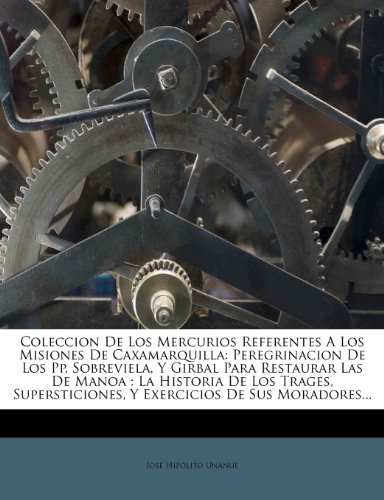
(This is a reproduction of a book published before 1923. T...)
This is a reproduction of a book published before 1923. This book may have occasional imperfections such as missing or blurred pages, poor pictures, errant marks, etc. that were either part of the original artifact, or were introduced by the scanning process. We believe this work is culturally important, and despite the imperfections, have elected to bring it back into print as part of our continuing commitment to the preservation of printed works worldwide. We appreciate your understanding of the imperfections in the preservation process, and hope you enjoy this valuable book. ++++ The below data was compiled from various identification fields in the bibliographic record of this title. This data is provided as an additional tool in helping to ensure edition identification: ++++ Coleccion De Los Mercurios Referentes A Los Misiones De Caxamarquilla: Peregrinacion De Los PP. Sobreviela, Y Girbal Para Restaurar Las De Manoa : La Historia De Los Trages, Supersticiones, Y Exercicios De Sus Moradores José Hipólito Unánue
http://www.amazon.com/gp/product/1247107639/?tag=2022091-20
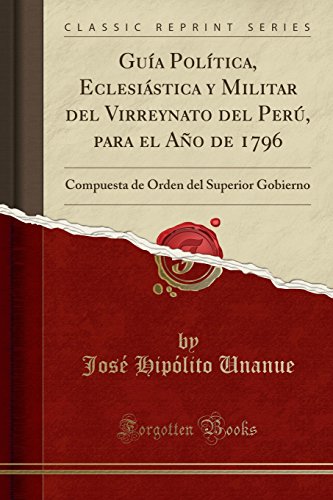
(Excerpt from Guía Política, Eclesiástica y Militar del Vi...)
Excerpt from Guía Política, Eclesiástica y Militar del Virreynato del Perú, para el Año de 1796: Compuesta de Orden del Superior Gobierno About the Publisher Forgotten Books publishes hundreds of thousands of rare and classic books. Find more at www.forgottenbooks.com This book is a reproduction of an important historical work. Forgotten Books uses state-of-the-art technology to digitally reconstruct the work, preserving the original format whilst repairing imperfections present in the aged copy. In rare cases, an imperfection in the original, such as a blemish or missing page, may be replicated in our edition. We do, however, repair the vast majority of imperfections successfully; any imperfections that remain are intentionally left to preserve the state of such historical works.
http://www.amazon.com/gp/product/0428285007/?tag=2022091-20
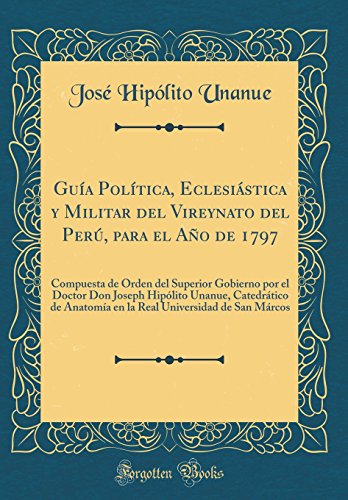
(Excerpt from Guía Política, Eclesiástica y Militar del Vi...)
Excerpt from Guía Política, Eclesiástica y Militar del Vireynato del Perú, para el Año de 1797: Compuesta de Órden del Superior Gobierno por el Doctor Don Joseph Hipólito Unanue, Catedrático de Anatomía en la Real Universidad de San Márcos About the Publisher Forgotten Books publishes hundreds of thousands of rare and classic books. Find more at www.forgottenbooks.com This book is a reproduction of an important historical work. Forgotten Books uses state-of-the-art technology to digitally reconstruct the work, preserving the original format whilst repairing imperfections present in the aged copy. In rare cases, an imperfection in the original, such as a blemish or missing page, may be replicated in our edition. We do, however, repair the vast majority of imperfections successfully; any imperfections that remain are intentionally left to preserve the state of such historical works.
http://www.amazon.com/gp/product/0428325866/?tag=2022091-20
meteorologist naturalist scientist cosmographer
José Hipólito Unánue was born in Arica, Peru, on August 13, 1755, of a well-to-do family who directed him toward an ecclesiastical career.
The influence of an uncle, Father Pedro Pabón, a botanist, turned him, however, from theology to medicine and general science, in which fields he was a brilliant student. He soon won a professorship in the School of Medicine of Lima, where he instituted the systematic practice of dissection.
Seeking to apply the most modern procedures, Unánue established the San Fernando School of Medicine and was the first to introduce vaccination in Peru. Under the enlightened Francisco Gil de Taboado, thirty-fifth viceroy of Peru (1790 - 1796), the first scholarly periodical, the Mercurio peruano (1791 - 1795), was established in Lima.
It was a vehicle for publicizing scientific, historical, economic, political, and statistical subjects, and together with a society called Amantes del País (Friends of the Country), of which Unánue was a founder, it stimulated a highly competent group of contributors.
Unánue's intellectual distinction drew him into the political life of his time. He early embraced the cause of independence from Spain, writing a manifesto in its favor in 1812 and serving as secretary of the treasury in the provisional government.
He was the presiding officer of the Constituent Congress, and as head of the Council of Ministers, he enjoyed the complete confidence of the "Liberator, " Simón Bolívar.
After the rejection of this concept of governing and the ensuing confusion in the public affairs of the new nation, he retired to private life and the resumption of his scientific interests.
Greatly venerated and honored, he died on July 15, 1833.
He was one of the foremost physicians and thinkers of the transition period from the colonial to the independence era. The 18th-century intellectual movement called the Enlightenment had its reflection in the viceroyalty of Peru, where a small group of individuals concerned themselves with developing and applying the revolutionary ideas of the emerging sciences. The ablest and most devoted student of these new trends in Peru was José Hipólito Unánue, an individual of diverse interests, a court physician, and an adviser of viceroys and presidents, whose life coincided with the transition from the 18th to the 19th century and from the viceroyalty to the republic.
He was also the First Minister of Finance of Peru, Minister of Foreign affairs, Protomédico (equivalent to Minister of health combines with head of "Escuela de Medicina del Peru"), university professor, founder of the San Fernando Medical School (now the Medicine faculty of San Marcos University), representative of Arequipa in the Cádiz Cortes, President of the Junta de Gobierno (highest executive power in the Peruvian government at that time), President of the first Peruvian congress, Protector of the province of Arequipa (during the Spanish Empire), independence precursor and a Peruvian politician, active in politics in the early years after independence.
Under the name "Aristo, " Unánue contributed essays and scientific papers to the 12 volumes of the Mercurio peruano, but it was in 1806 that his most famous study was published in Lima. It was entitled Observations on the Climate of Lima and Its Influence on Organic Life, Particularly Mankind, and in it he anticipated many ideas of the science of anthropogeography.
(Excerpt from Guía Política, Eclesiástica y Militar del Vi...)
(Excerpt from Guía Política, Eclesiástica y Militar del Vi...)
(Excerpt from Observaciones Sobre el Clima de Lima, y Sus ...)
(Excerpt from Al Rey Nuestro Señor el Pensador del Perú L...)
(This book was digitized and reprinted from the collection...)
(This is a reproduction of a book published before 1923. T...)
(This is a reproduction of a book published before 1923. T...)
(This is a reproduction of a book published before 1923. T...)
He wrote prolifically on education, metaphysics, and ethics, as well as on medicine, and he strongly defended Newtonian theories of physics and mathematics.
Always a man of deep moral and religious convictions and a dispassionate patriot, Unánue advocated a strong central control of public affairs. He was a member of the commission seeking to tender the government to a European prince.
